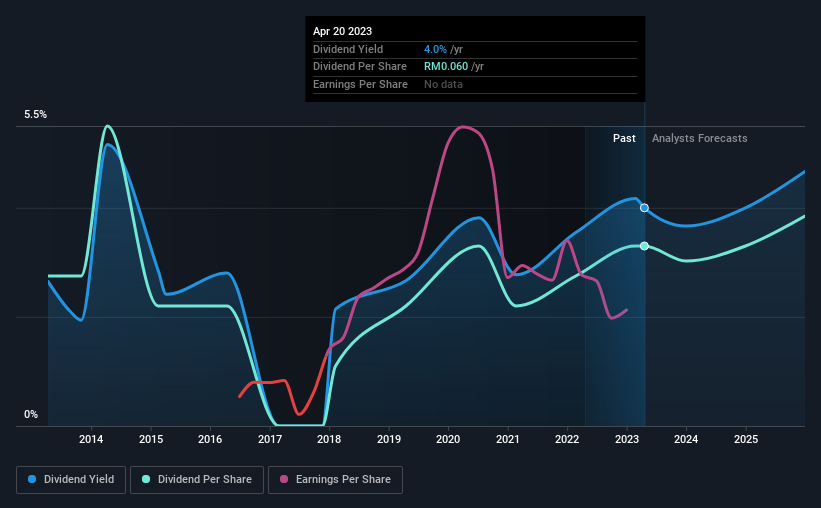- Malaysia
- /
- Construction
- /
- KLSE:KKB
KKB Engineering Berhad (KLSE:KKB) Is Paying Out A Larger Dividend Than Last Year
KKB Engineering Berhad (KLSE:KKB) will increase its dividend from last year's comparable payment on the 15th of June to MYR0.06. This will take the dividend yield to an attractive 4.0%, providing a nice boost to shareholder returns.
View our latest analysis for KKB Engineering Berhad
KKB Engineering Berhad's Dividend Is Well Covered By Earnings
A big dividend yield for a few years doesn't mean much if it can't be sustained. Before making this announcement, KKB Engineering Berhad's dividend was higher than its profits, but the free cash flows quite comfortably covered it. Generally, we think cash is more important than accounting measures of profit, so with the cash flows easily covering the dividend, we don't think there is much reason to worry.
Analysts expect a massive rise in earnings per share in the next year. Assuming the dividend continues along recent trends, we estimate that the payout ratio could reach 47%, which is in a comfortable range for us.

Dividend Volatility
The company has a long dividend track record, but it doesn't look great with cuts in the past. Since 2013, the dividend has gone from MYR0.05 total annually to MYR0.06. This means that it has been growing its distributions at 1.8% per annum over that time. The dividend has seen some fluctuations in the past, so even though the dividend was raised this year, we should remember that it has been cut in the past.
KKB Engineering Berhad's Dividend Might Lack Growth
Growing earnings per share could be a mitigating factor when considering the past fluctuations in the dividend. It's encouraging to see that KKB Engineering Berhad has been growing its earnings per share at 45% a year over the past five years. Strong earnings is nice to see, but unless this can be sustained on minimal reinvestment of profits, we would question whether dividends will follow suit.
In Summary
Overall, we always like to see the dividend being raised, but we don't think KKB Engineering Berhad will make a great income stock. The payments haven't been particularly stable and we don't see huge growth potential, but with the dividend well covered by cash flows it could prove to be reliable over the short term. Overall, we don't think this company has the makings of a good income stock.
Companies possessing a stable dividend policy will likely enjoy greater investor interest than those suffering from a more inconsistent approach. Still, investors need to consider a host of other factors, apart from dividend payments, when analysing a company. As an example, we've identified 3 warning signs for KKB Engineering Berhad that you should be aware of before investing. Is KKB Engineering Berhad not quite the opportunity you were looking for? Why not check out our selection of top dividend stocks.
Valuation is complex, but we're here to simplify it.
Discover if KKB Engineering Berhad might be undervalued or overvalued with our detailed analysis, featuring fair value estimates, potential risks, dividends, insider trades, and its financial condition.
Access Free AnalysisHave feedback on this article? Concerned about the content? Get in touch with us directly. Alternatively, email editorial-team (at) simplywallst.com.
This article by Simply Wall St is general in nature. We provide commentary based on historical data and analyst forecasts only using an unbiased methodology and our articles are not intended to be financial advice. It does not constitute a recommendation to buy or sell any stock, and does not take account of your objectives, or your financial situation. We aim to bring you long-term focused analysis driven by fundamental data. Note that our analysis may not factor in the latest price-sensitive company announcements or qualitative material. Simply Wall St has no position in any stocks mentioned.
About KLSE:KKB
KKB Engineering Berhad
Engages in the steel fabrication, civil construction, hot dip galvanizing, and LP gas cylinders manufacturing businesses in Malaysia.
Flawless balance sheet with high growth potential.
Market Insights
Weekly Picks


Crazy Undervalued 42 Baggers Silver Play (Active & Running Mine)


Fiducian: Compliance Clouds or Value Opportunity?

Willamette Valley Vineyards (WVVI): Not-So-Great Value
Recently Updated Narratives

Moderation and Stabilisation: HOLD: Fair Price based on a 4-year Cycle is $12.08


Positioned globally, partnered locally


When will fraudsters be investigated in depth. Fraud was ongoing in France too.
Popular Narratives


MicroVision will explode future revenue by 380.37% with a vision towards success


NVDA: Expanding AI Demand Will Drive Major Data Center Investments Through 2026





